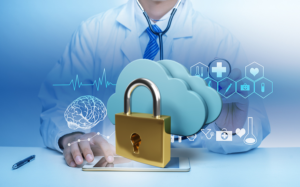in: Home Health Care, Company News

It’s a nightmare that no home healthcare agency wants to face: a cyber-attack. Although many companies think they’re too small to be the target of an attack, 43% of all cybercrime is committed against SMBs. And, sadly, a whopping 95% of security breaches are due not to sophisticated software-based attacks but to human error—an employee accidentally divulging a password, allowing a criminal access to systems, or clicking a phishing link.
For a home healthcare agency, a data breach can be catastrophic. The sheer volume of PII (personally identifiable information) contained within a home healthcare agency’s accounting systems is a juicy target for any criminal. Add to that the number of employees many home healthcare agencies have and the need for each of them to log into the system multiple times per day to record hours, visits, and data from each visit and you have many potential vulnerabilities.
Here, we share with you some ideas for safeguarding your company’s valuable data, including transitioning to a cloud-based home healthcare accounting system, which offers added layers of security and protection for your company, patient, and provider information.
Basic Cyber Security Tips
- Increase security awareness among your staff: Because so many security breaches occur due to human error, it’s vital to ensure that everyone on your team is aware of potential risks. Don’t assume that everyone knows what a phishing email looks like, for example, or that people understand the risks of reusing passwords. Work with a professional or develop your own cyber security training to cover the basics. Awareness is the best prevention step.
- Keep your software up to date: You know those pesky reminders to update your software? Pay attention to them—and act upon them when prompted. Software updates provide important services such as patching known code risks and shoring up your cyber defenses behind the scenes. Updating software should also include updating websites, especially WordPress-based websites which use plugins. Plugins are special programs added to a base WordPress website; they are usually created by third parties to add specific functionality to the site, such as contact forms, photo collages, etc. If you do run a WordPress site, check, and update plugins when required to do so.
- Set up two-factor authentication: Yes, we know it can be a pain in the neck to enable two-factor authentication, but it’s one of the best methods to prevent unauthorized systems access. Two-factor authentication requires users to input their username or email address and password, then receive and input a code, which is often sent to a cellphone.
- Back up all data to an external hard drive: Frequent backups ensure that in the event your system does become compromised, you can restore it quickly. Always back up to a separate device; if the main device becomes infected with malware or compromised in any way, a separate device ensures the backup is free from malicious code.
- Install and maintain adequate security programs: These may include general security antivirus programs as well as specialized programs against malware. Invest in the best protection you can for your systems.
Cloud Systems Offer Excellent Security
Many home healthcare agencies are moving their accounting platform from on-premises software to a cloud-hosted system. Cloud computers use networks of servers connected through the internet to provide exceptional security. Not only are such systems protected by multiple firewalls, but they also nearly always back up data frequently so that in the event of a potential breach, you have a clean backup to restore your system. Additionally, cloud systems use servers in various physical locations, another plus in the event of a natural disaster or power outage affecting a specific geographic location. The redundant servers pick up the slack, providing seamless access to critical systems.
One final benefit of cloud accounting systems for home healthcare agencies—access on the go. For a busy agency, a cloud-based system enables caregivers, aids, and others to log in between or from appointments to update patient records, time logs, and appointment notes. This provide quick access to up-to-the-minute data, ensuring your files are accurate, and reports are timely.
No matter what system you choose for your home healthcare agency’s accounting needs, good cyber security practices are a must. With so many criminals targeting small and mid-sized businesses, having a solid plan and a well-trained team goes a long way to spotting and preventing potential threats.
For more information on cloud accounting systems for home healthcare agencies, contact us or call 512-990-3994.